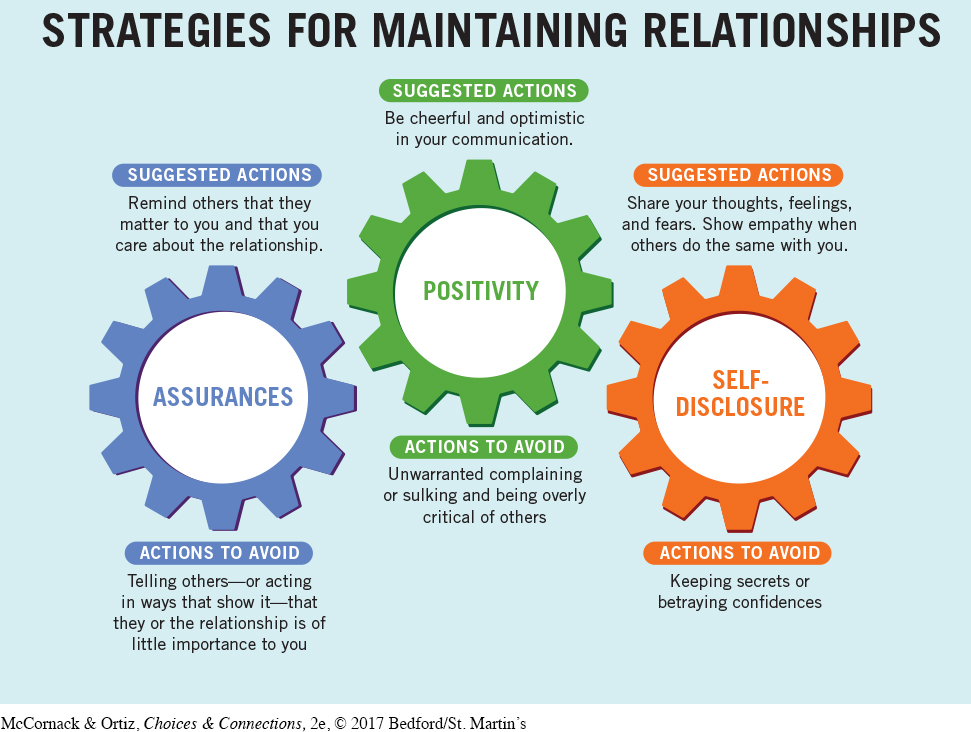Relational Maintenance
Relational maintenance refers to the use of communication behaviors to keep a relationship strong and to ensure that each party continues to draw satisfaction from the relationship (Stafford, Dainton, & Haas, 2000). Across years of research, communication scholar Laura Stafford has observed three strategies that help romantic partners, family members, friends, and coworkers maintain their relationships: positivity, assurances, and self-
Positivity. Arguably the most powerful maintenance tactic in sustaining healthy relationships is positivity—communicating in a cheerful and optimistic fashion, doing unsolicited favors, and giving unexpected gifts (Stafford, 2010). Cross-
2 All bulleted items that follow adapted from the revised relationship maintenance behavior scale of Stafford (2010).
try to make interactions with others enjoyable;
make an effort to build others up by giving them compliments;
strive to be fun, upbeat, and optimistic with others.
You undermine positivity when you
constantly look for and complain about problems in your relationships with others without offering solutions;
whine, pout, and sulk when you don’t get your way;
criticize favors and gifts you’ve received from others.
How can you implement positivity in your interpersonal relationships? Start doing favors for your relationship partners without being asked, and surprise them with small gifts that show you care. Invest energy into making each encounter enjoyable. Avoid complaining about problems that have no solutions, ridiculing others, whining or sulking when you don’t get your way, and demanding favored treatment from others. Show appreciation when someone does something nice for you. Positivity can be especially helpful at work, since it can help offset the stresses you and your coworkers will inevitably face. (See Table 10.1.)

Assurances. Another powerful maintenance tactic in boosting relationship satisfaction is the use of assurances—messages that emphasize how much your relationship partners mean to you, point out how important the relationships are to you, and show that you see a secure future together. You use assurances when you
regularly tell your partners how important they are to you;
talk about future plans and events that you’ll share together;
do and say things to demonstrate the depth of your feelings.
You undermine assurances when you
suggest that other relationships and things in your life are more important than your relationship partners;
tell your partners not to count on anything long term;
systematically avoid expressing any type of enduring relationship commitment to your partners.
In romantic relationships, family relationships, and friendships, you may express assurances directly by saying things like “I love you” or “You’re my closest friend.” You may also emphasize how much you value your time together—
Mediated communication provides lots of ways to maintain your relationships. Sending a text to tell your girlfriend you are thinking of her, posting a funny picture to brighten a friend’s day, and sending a short video to your grandparents are easy ways to let others know you care.

Self-
However, when you use self-
tell your partners about your own fears and vulnerabilities;
share your thoughts and emotions with them;
encourage them to disclose their thoughts and feelings, and offer them empathy in return.
You undermine self-
make fun of or criticize your relationship partners’ perspectives;
routinely hide important information from them;
betray them by sharing confidential information about them with others.
To foster disclosure with your lovers, family members, and friends, routinely make time just to talk. Encourage them to share their thoughts and feelings about issues that matter to them, whether it’s online, face-
In your workplace relationships, you can use self-